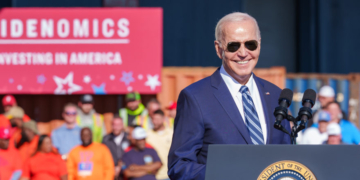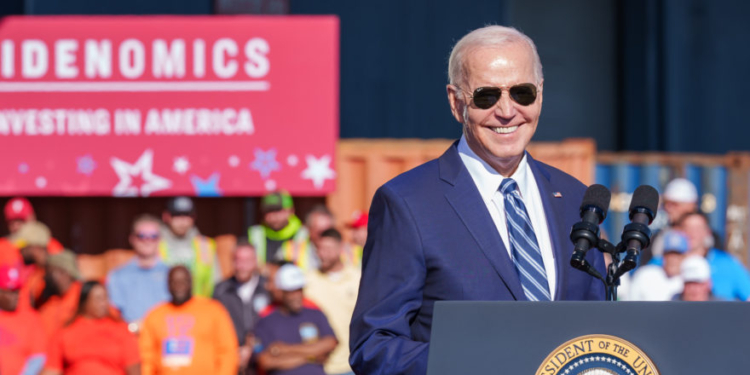U.S. discount retail chain Big Lots filed for bankruptcy Monday as Biden-Harris era inflation continues to weaken consumer spending and push retailers out of business.
The company filed for Chapter 11 protection after posting consecutive quarterly losses since 2022 and being forced to close numerous stores, operating roughly 1,300 stores in the U.S. as of May compared with 1,425 in early 2023, according to The Wall Street Journal. Big Lots also announced it had secured over $700 million in funding to guide the company through the bankruptcy process and ensuing sales process, with an affiliate of private equity firm Nexus Capital Management expected to acquire the company.
“The actions we are taking today will enable us to move forward with new owners who believe in our business and provide financial stability,” Chief Executive Bruce Thorn said in a Monday press release.
The Chapter 11 filing follows a wave of bankruptcies in the retail industry, with 21 retailers filing for bankruptcy through July 16 — a record for the same period of any year since the pandemic began in 2020, the WSJ reported. The retail sector lost 11,100 jobs in August, according to Bureau of Labor Statistics data.
The bankruptcies and job losses come as inflation has driven consumers to spend more selectively.
“Like many other retail businesses, the Company [Big Lots] has been adversely affected by recent macroeconomic factors such as high inflation and interest rates that are beyond its control,” the company wrote in its press release. “The prevailing economic trends have been particularly challenging to Big Lots, as its core customers curbed their discretionary spending on the home and seasonal product categories that represent a significant portion of the Company’s revenue.”
Prices have risen more than 20% since President Joe Biden took office in January 2021, peaking at 9% in June 2022, up from 1.4% at the end of Former President Donald Trump’s term.
Consumer sentiment plummeted amid rapid inflation in 2022, and has since “remained within the narrow range that has prevailed over the past two years,” according to Dana M. Peterson, Chief Economist at The Conference Board. Just 20.8% of consumers said business conditions were “good” in August, according to the Consumer Confidence Survey (CCS).
Consumers have also grown increasingly anxious about the labor market after jobs growth fell below economist expectations in both July and August, with just 32.8% of consumers saying jobs were plentiful in August, compared with 33.4% in July, the CCS showed. They’ve also grown less upbeat about the stock market following a global market sell-off in August, with just 46.9% of respondents expecting stock prices to increase over the year ahead, compared with 50.6% in July.
There has also been an increase in restaurant closures and bankruptcies in response to these economic headwinds, with the world’s largest seafood chain, Red Lobster, filing for Chapter 11 bankruptcy in May and Hooters shuttering roughly 40 locations in June.
Big Lots did not immediately respond to a request for comment.
All content created by the Daily Caller News Foundation, an independent and nonpartisan newswire service, is available without charge to any legitimate news publisher that can provide a large audience. All republished articles must include our logo, our reporter’s byline and their DCNF affiliation. For any questions about our guidelines or partnering with us, please contact [email protected].


























